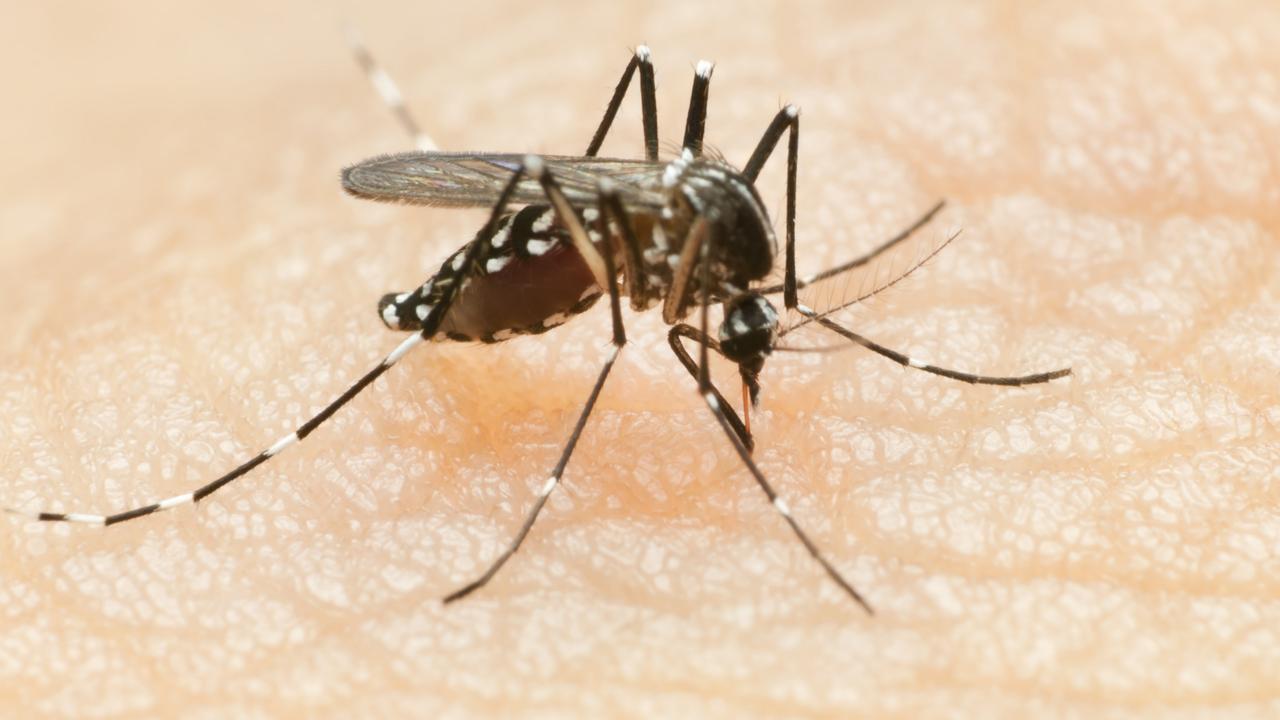The Iceman Cometh: An extract from These Things Happen by Greg Fleet
COMEDIAN Greg Fleet obliterated his heckler with a torrent of abuse. His vile words hid something even more sinister.

Health
Don't miss out on the headlines from Health. Followed categories will be added to My News.
WARNING: Graphic content and coarse language
I AM not anti-drugs. I believe that there are things to be learned from taking certain drugs. Drugs can take you down a road to enlightenment. Drugs can be fun.
But ice? No.
Ice, if it chooses to take you anywhere, will eventually try to take you backwards down a one-way alley that leads to madness, fear, irrationality, delusion, suicide and murder. Most of those don’t fit under my subheading of “fun”.
This may be a crap analogy, but if you can consider drugs as children, ice (or crystal meth) is the bad seed. The kid that will start killing pets and then grow into a serial murderer.
“That kid just ain’t no good.”
As with most children, ice is so cute and fun when it’s still a baby. But as it grows, you start to notice things. Like how it will never meet your eyes.
One of the reasons this drug has the ability to tear your world apart is that, like most bad relationships, the beginning is heavenly. You feel confident and capable. Strong and more focused than ever before. You feel as though you could do anything. And you probably could. This may be why the Japanese (who I’ve been told invented the drug) gave meth to their kamikaze pilots.
“Fly this plane into that ship.”
“No way.”
“OK, take this drug. Now fly this plane into that ship.”
“Cool.”
I have taken ice. I have smoked it, I have injected it, I have snorted it. Believe me, I am not bragging. I am attempting to show you how, in certain situations, I know what I’m talking about. At one point around 2004-05, my then-partner Catherine and I took ice for about six months.
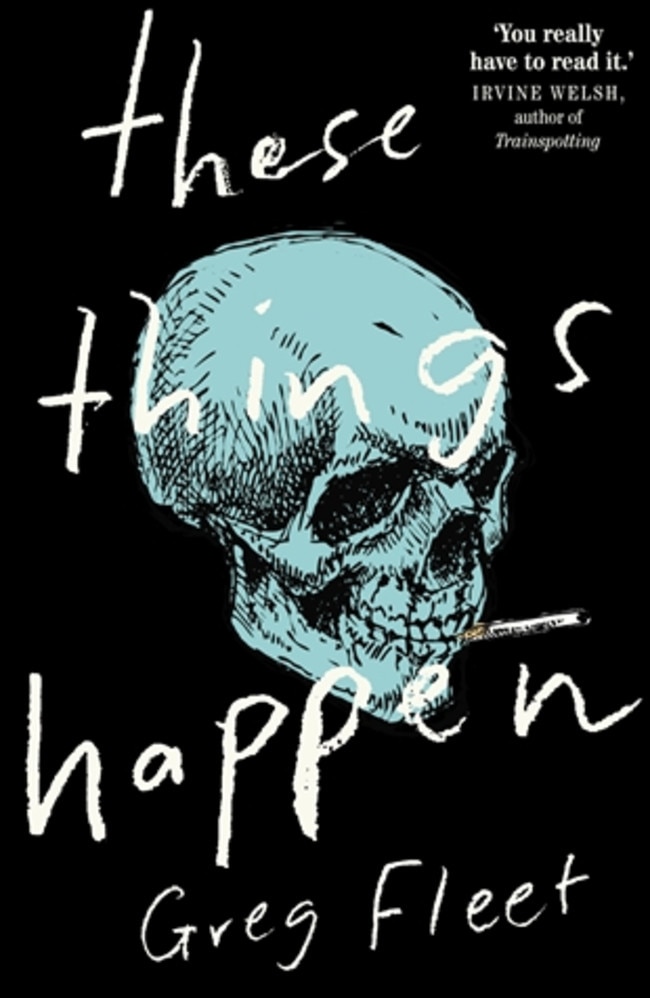
For a fairly gruesome description of that time, read on, Macduff.
The reason that Catherine and I were taking ice was because I’d recently had a naltrexone implant surgically inserted into my body, in an effort to stop taking heroin. Naltrexone is a chemical that acts on the brain’s opioid receptors and, among other things (though this is the biggie), blocks the euphoric feeling that accompanies the use of opiates. If you are on naltrexone you will not feel the effects of heroin, thus making using it pointless. Most implants remain effective for about six months.
To get a naltrexone implant you must first dry out, or go through withdrawal from heroin and stay off it for three days or so. You then go to a cold and sterile clinic where a doctor will make an incision about 10 centimetres below your navel. The doctor will scrape around inside the incision with a scalpel (the worst part) and make a hole big enough to fit the implant. A naltrexone implant is about three centimetres long and half a centimetre wide. They then insert the implant into the hole and sew you up. You can feel it as a hard lump under your skin. And for about six months you will no longer feel the effects of heroin.
If you are as committed a heroin user as I was, you will go out and have some heroin just to see if it works or not.
But a naltrexone implant is a quick fix. It’s like putting nail varnish on a cracked windscreen. It will work for a while, but one day that shit is going to cave in on you. Probably in about six months, and probably when you are driving.
As soon as I had my new cyborg-like upgrade, I left the clinic and scored. I took the heroin. I waited. And … nothing. I felt nothing. I was free!
I wasn’t free. I was just out on parole.
And if heroin was a prison from which I’d just been released, I was about to start taking a drug that was a psych ward.
A loony bin.
A ship of fools. Ice, ice, baby.
During early meth use, no problem seems insurmountable. You feel as though your brain and body are operating at an elevated level. And then there is the sex. This will be difficult because I, in no way, want people to take ice, not even once. By the end of this chapter I imagine you will know why I feel that way.
But the sex …
My sex life up until that point had been fairly pedestrian. I am, generally speaking, fairly quiet during sex. I’m not demonstrative. I don’t yell porn cliches. If anything, I get intimidated by people who do. I enjoyed sex, but I was more driven by the desire for heroin. And heroin makes you not really care about sex. It makes you not really care about anything.
We started doing things I had never done. We started playing roles when we had sex. We would pretend to be other people. At first, those people were types: bikers, professors, handymen and bored sex-mad cellists. It was amazing.
Then we started having sex with each other while pretending to be various people that we actually knew. I cannot begin to explain the complexities and thrills of that game. To this day I see people I know and think, I have sort of had sex with you, and it was brilliant, or worse, I think, I have had sex with someone while pretending to be you.
For us, sex on ice was deep and wild and compelling. It lasted hours and was usually performed in front of a full-length mirror. (I was thinner then.)
This was all happening in the first three weeks or so of us taking ice. Looking back now, I can see that we were already going insane. We honestly thought we were in heaven, and perhaps we were. But we had travelled there on wings made of wax. And what is it that they say about flying too close to the sun?
Ice, ice, baby.
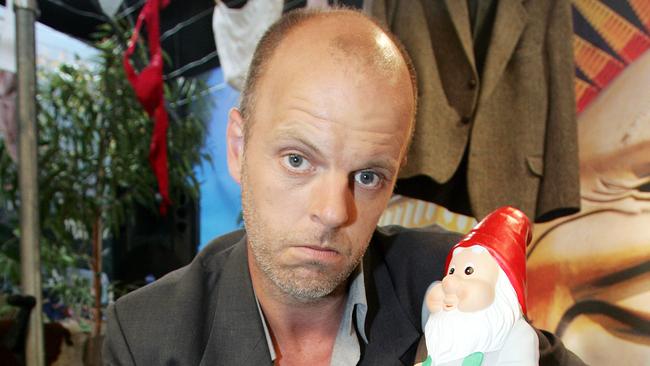
About two months into our ice usage, the glory days of amazing sex and elevated thought began, almost imperceptibly, turning to shit. The maze was no longer easy to navigate.
With most long-term drug use, what the user is doing is trying to get back to the beginning. Back to the early days when the drug made you feel so good. But you can never get back there. Back there does not exist anymore. Not on this timeline. It’s a false economy. But you will keep trying. Eventually it becomes like a snake swallowing its own tail. Sad and destructive and doomed to nothingness.
“If we have just one more … just one more … I KNOW we can get back there. I’m pretty sure I know …”
You don’t. You can’t. I’ve tried.
You may think that you are good with directions, or that you can remember the map. But the map is always changing. It’s in a constant state of flux. You could get lost and wander off the edge of the world (if the world wasn’t so round and full of oceans).
Catherine and I must have known subconsciously that this experiment was doomed to end badly. We started turning on each other. Things became not very nice. But we stayed the course. We kept running because that was all we knew how to do.
Two months into our ice use, I had to go on a comedy tour to Perth (yay!) and the regional north of Western Australia (boo!). I’m not trying to be mean to places like Port Hedland, but when you are 4000 kilometres away from your lover and you are experiencing amphetamine psychosis for the first time, the last place you want to be is some town where the most interesting things to see are racism and sand.
Flying to Western Australia meant suddenly being without ice. This was the early 2000s and the likelihood of stumbling over crystal meth in Perth was small. Ironically and dangerously, ice is now all over that fair city and, to be honest, most cities. It’s a scourge. Up to that point, I thought heroin was the only drug that was hard to come off. I was clearly very wrong. While ice, for me at least, was not so much physically hard to withdraw from, it was emotionally and psychologically devastating. I went into psychosis.
And, like most insane people, I had no idea that I was insane. The psychosis that I experienced by suddenly stopping ice was revealing itself as extreme fear and rampant paranoia. I began to catastrophise. For the two weeks I was on tour, I became convinced that on the other side of the country, Catherine was not only taking ice and having fun but that she was f***ing other people and having orgies. It was not the idea of her having random sex with several people at once that upset me. If I had been there in that situation, I would have jumped in with both feet.
What terrified me, being 4000 kilometres away from her in some desert town, was that I had been forgotten. That life, our life, was going on without me.
I had heard of the term “the tyranny of distance”, but I had never felt it before, and it felt like my funeral.
It felt like I was dead.
I became irrationally obsessed with the idea that Catherine had abandoned me. I called or sent long, accusatorial text messages about 30 times a day. For 15 days. That’s about 450 times, or what the Dutch would call “a shitload of phone calls”.
Catherine said and did nothing to alleviate my fears. Because she, too, was, by that stage, quite mental; I think she rather enjoyed all the drama. She let my mania run wild.
She certainly had my full attention.
Now, keep in mind that while all of this madness was going on, I was travelling around with six other people doing stand-up comedy every night.
I was the craziest person on planet Earth, and my job was to make people happy.
Having been a drug addict for close to 20 years by that stage, I was used to performing in various stages of disrepair. That comes with the territory of:
1. Being a comedian,
2. Being a drug addict and, more importantly,
3. Being both.
While I had clearly, at times, been trashed on stage, I rarely worked completely shitfaced. I have always known that having the ability to control a room makes for better gigs. While I didn’t often work smashed, I worked even less often completely sober. As important as control is, I also always felt that getting a little bit loose was usually helpful to create a vibe of relaxation and thrills at the same time. What I did even less often than working smashed or sober was work while going through withdrawal. That combination of desperation, fear and hunger for chemicals, mixed with the physical pain of detoxing, makes it hard to concentrate on entertaining a room full of strangers. Occasionally I had worked while going through heroin withdrawal and it was horrible, but nothing like this. I was unravelling daily. I was having a mental breakdown, but I didn’t know it.
During the shows, I could for the most part fake it. Say things that I knew were funny because I’d said them before and people had laughed. Sometimes, while in the middle of a routine, I would catch myself thinking about Catherine and how unfair everything was. It was unlike how I would normally work, but it was all that I had. For the most part, I got away with it.
But a few times, someone in the crowd would do or say something negative, yell something out. This is part of my job. Even though I don’t like it, I deal with it.
But back then? Four thousand kilometres away? In that state of mind? I lost my shit each and every time it happened. It did only happen a few times, but that was a few times too many.
It usually went down like this. Some arsehole would yell out some fairly innocuous comment and I would say something cutting to put them in their place. The rest of the audience would laugh and clap. So far, so normal. Comedy 101.
But then, I wouldn’t let it go. I would continue to berate the person with vicious and deeply personal attacks. I was like a fighter who didn’t stop when his opponent was unconscious. Relentless abuse. And it would come in waves.
“You tiny little man, you piece of f***ing shit … Have you got anything else to say? No? Of course not. You are a coward. You are scum. I can smell the creepy loneliness just oozing out of your pores. You are the worst part of all of our lives. Seriously man, kill yourself. You know that you should. Go home and eat a f***ing gun, you waste of oxygen. You vacuum. You nothingness.”
And as I said these things, I meant every word.
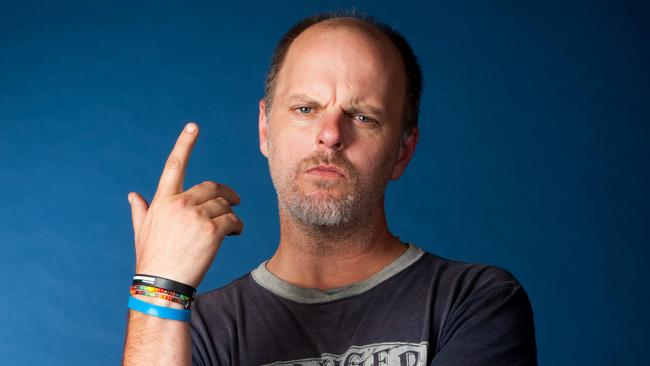
This was beyond the call of duty. Not even an attempt at banter or being clever. Just flat-out, horror-show abuse. Language as a weapon. Inevitably, when I would finally stop (and this would sometimes go on for five minutes or more), I would sense that something fundamental had changed. I would look out at the rest of the audience, the very same people who had clapped and giggled at my early put-down of the interloper, and they would be looking back at me in abject fear.
I didn’t know if the fury came from the drugs, the lack of drugs, or if it had always been in me, down in the darkest place, lying dormant. Wherever it came from, whatever had spawned it, it was out in the light now, and it was a monster. It was as though I was murdering someone. And on some level I was, just not the person that they thought I was murdering.
On my return from the wild west, things returned to normal for Catherine and me, and by normal, I mean we merrily continued our descent into the third circle of hell.
As it turned out, she had indeed indulged in a little bit of extramarital fun. This caused two main problems. The obvious one was that she had had sex with someone else while I was away. That’s a red card in most relationships. But the more insidious problem was that her doing this justified all of my madness out west. Instead of realising how crazy I had become, I suddenly felt vindicated. Those 450 phone calls were not the act of an obsessive maniac but the tragic cries in the wilderness of a lover betrayed.
So, Catherine and I broke up. For 24 hours.
In that time I went and had sex with our ice dealer.
I felt so much better after the sex. I felt the playing field was level again.
Cuckoo.
When Catherine and I got back together the next day, I told her everything. We had now both had sex with other people. She was hurt and angry but there wasn’t a lot that she could do about it. Other than quietly plot …
I have always said that the only reason I had sex with our dealer that day was because Catherine and I had broken up. I was a free man. I was single.
That’s bullshit. It was straight-up revenge. And revenge is a dish best served irrationally.
By now, if Catherine and I weren’t scoring ice, we were fighting. While we were out scoring, we were fine. We had a shared goal: finding money, then obtaining more drugs. The bulk of the money came from my telling amusing tales for cash, but we also burned through her small wage every week. As long as we could focus on, say, calling my manager, or going out to the bank — whatever it took to get money — we were fine. Problem-solving was one of our few skills.
Here is a sad fact: the most fun we had together in the late stage of our disease was the 10 minutes or so that we had between getting the money and buying the drugs. That little window was packed with potential and excitement. The walk from the bank to our dealer’s flat was one of the few times that we would actually hold hands or laugh with each other.
Once we had used the drugs (by then almost always injecting them to get the maximum impact) and the rush had come and gone, we were usually ready to fight. Our fights would start a few minutes after taking the drug, usually at our dealer’s place or on the street as we walked home. The main reason that drug users fight is because they hate themselves.
If you are remotely bright or talented at something, but instead of chasing that dream you are chasing a drug habit, you grow to loathe yourself and those around you. I’m sure that most of the fights between us were just projection. It’s hard to accept that you are ruining your life, let alone that you are complicit in ruining the life of someone you love. It’s far easier to see your partner and think, no, you are ruining my life.
We shouldn’t have been so down on each other. Our hatred of each other was just a deep dissatisfaction with ourselves. Following that line of thought, I shouldn’t have freaked out so much when she tried to kill me.
Have you noticed that people on ice will have major public screaming matches that involve intensely personal things being revealed to the world at a very high volume? Other people don’t do that. I very recently saw two meth heads hurrying down the street in Perth squabbling at mucho decibels.
Lights up on two ice addicts.
Her: I didn’t suck him off, Gary, I just f***ed him twice!
Gary: Well, I hope you gave him f***ing chlamydia!
What? Was this girl a loud koala in a human suit? If so, where was her clipboard and collection bucket?
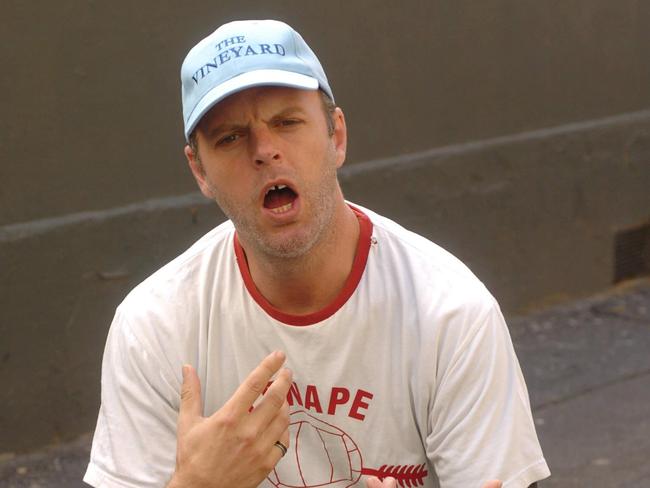
Catherine and I went to that place. Maybe not the “sucked him off” or “chlamydia” chat, but we began to have loud public arguments about personal things.
Sex. Drug use. Past lovers. It was all for public consumption, and generally, I assume, the public weren’t interested. We were putting on a show that not many people really wanted to see. We were like a bad, X-rated community theatre troupe. I think this behaviour appealed to our sense of the dramatic. The theatrical.
The next time you see a couple of ice monkeys yelling private information at each other in a public space, ignore the words and watch their eyes. I think you will see in them, even if only for one second, a flair for the dramatic. A love of the stage. After all, it is very “look at me” behaviour. I’m surprised that people on ice don’t scream at each other to get our attention, then jump into some busking. Do a couple of prepared monologues. Bust out some Pinter or Mamet. I’d pay $5 to see some tweaker lay a little Shakespeare down. Loudly. Boom.
For Catherine and me, the drug had changed. It was now running amok. Its need to ramp things up was no longer dictated by what was good or fun. Now it ramped up everything in sight. And if everything in sight was bad or negative? Damn the torpedoes. We’re going to Def Con Ramp.
Catherine and I had a fight in my dressing room during the Melbourne International Comedy Festival, just before I was to go onstage. I can’t remember what it was about. Probably the relative merits of Swiss food. But the fight very quickly got screamy. Loud. Like, as-loud-as-two-tall-people-can-scream-at-each-other loud. Catherine stormed out and down the stairs. I stuck half of my body out a third-floor window over Flinders Lane and waited.
When she hit the street, I started berating her like a psychopath, yelling abuse out the window. People looked at me from the street. People looked at her. She yelled a couple of things back and started walking away, but the monster was out of the box. I rained insults down on her from above.
Stage direction: this passage should be yelled as loudly as the actor can yell.
Fleet: (hanging out window) You f***ing whore! F*** you, you stupid f***ing bitch. I despise you, you are beneath me, you f***ing c*** …
It was like the Blitz, but wordier.
Now, as I was screaming (and I mean seriously trying to blow my throat out screaming), a small but crucially rational part of my brain heard the stage manager of my show announce, “Ladies and gentlemen, please make welcome to the stage, a very funny man, Mr Greg Fleet!”
And I snapped back to reality. My show. NOW!
I was separated from the audience of maybe 130 people by a thin plaster wall and an open door. They had heard it all. Every vicious word. This could be a disaster.
“Quick! Someone in my brain call a meeting, STAT!”
I had about three seconds to make a plan. I rolled the dice.
I took the stage and said, “Good evening, ladies and gentlemen. I think I may have just broken up with my girlfriend.”
The audience laughed and clapped. They found me amusing. They thought the shouting was part of the show. And I guess it was. It was a part of the show, just not intentionally. I even tried in the middle and after the show to tell them. To tell them the truth.
“No, what happened earlier with the yelling — I was actually yelling at my lover.”
“Ah, Fleety, you are a crack-up, mate.”
Yeah. I’m hilarious.
Loud public displays of repugnance are all well and good, but what is the point of psychosis if there isn’t a little touch of the old ultraviolence added to the mix, am I right?
By the time of Catherine’s little “this is me actually attempting to end you” episode, our fights had gotten pretty scary.
I made a lot dramatic threats. I would threaten to punch her. I recall using the phrase “knock you the f*** out” quite often.
She, on the other hand, would just do it. All action, no talk.
Quite admirable, really. She would unleash a punch to my head (but not the face — it was our money maker), or she would throw a frying pan at me. Pretty standard spousal abuse gear.
One horrible thing (besides threatening her with fists and kitchen appliances) that I used to do was grab her. I would, sometimes, in an attempt to not get punched again, grab her roughly and violently and contain her. I would hold her down and get on top so that she couldn’t really move. I did this a lot. I told myself it was to stop her throwing another punch, but I think there was more to it. I am claustrophobic. If someone bigger got on top of me and held me in such a way that I could hardly move or breathe, I would be terrified.
She usually was.
For us, the end of the great Ice Age came in a rush. The same way it began, but uglier.
One night we had the craziest, most pointless fight we’d ever had. By then we were both ranked top 10 in the world for meaningless insane disputes. It was also the most violent confrontation we had experienced. Now, remember we were (at least temporarily) insane. Catherine threw her phone at my head. The phone was destroyed, my head less so.
I retaliated by getting a huge saucepan of water and dumping it on her while she was in our bed. She then punched me numerous times in the face. (Yes, the money maker. No respect.)
I decided at that point that threatening her with a horrifically large carving knife was the only reasonable thing to do. She totally trumped me by running at the knife numerous times, seemingly quite happy to be stabbed to death just to win an argument. I was showing myself to be someone who lacked commitment by moving the knife so that she would not die and I would not become her killer.
The whole knife thing freaked us both out and eventually a truce was called. We slept fitfully in a very wet bed, surrounded by pieces of what was once a phone.
The next day, hostilities resumed. Catherine claims I rang her 39 times in a row to abuse her (she obviously had a spare phone). I don’t remember doing that, so it probably happened.
What I do remember is this: I had been to visit my ex and my daughter (how lovely for them) and was walking down the road where they lived. It was a small street and, being tall, I chose to walk on the actual road rather than ducking trees and bushes while walking on the footpath. It was a lovely, warm, early summer’s day in St Kilda.
I heard a car and I remember thinking, that car is travelling a bit fast. This is a small street. There are families with kids. And hey, I’m walkin’ here!
It happened very quickly. The engine noise grew louder and I had the sickening realisation that the furious car was coming for me. Deliberately. Someone was trying to run me over. I jumped onto the footpath but that made things worse. I looked over my shoulder at a blue car I had never seen before and realised I was trapped. In front of me was a brick wall, behind me was a car doing about 50 kilometres an hour. There was nowhere to go. I was f***ed.
In the one second or so that I had before impact, I got a bit Starsky & Hutch and just jumped straight up into the air. Not left or right, but a vertical leap. It saved me. The car smashed into the wall, destroying much of the brickwork and a lot of its own front end. I landed on the bonnet of the car like an uncoordinated cat and glared at the mystery driver.
It was Catherine.
As a final example of the mutual madness that we now called home, on seeing that it was Catherine behind the wheel, that it was her who had tried to kill me, I had two thoughts in rapid succession.
The first was: YOU CRAZY F***ING PSYCHO BITCH! You just tried to murder me!
The second was: You are so f***ing hot. You tried to run me over! That is the sexiest thing that has ever happened to me. I want to f*** you so much!
Later that day we decided to stop taking ice. And bizarrely, we did. It had been six months. For some reason, that number seemed important.
Six months.
That day my phone rang.
Me: Hello?
Him: Hello friend!
Me: Heroin … is that you?
Him: It sure is, old buddy!
Me: Wow, how long has it been?
Him: Six months.
Me: Six months … wow … of course … six months. So, how have you been?
Him: Well, I’ve been missing my old friend.
Me: Yeah, I’ve missed you too. It’s been very crazy around here since you left.
Him: Well, you don’t need to worry anymore. Do you know why?
Me: No. Why?
Him: Because, silly, I’M BACK!
Greg Fleet’s memoir, These Things Happen will be published by Macmillan Australia on Tuesday. RRP $34.95. Fleet will appear on ABC TV’s 7.30 on Monday night.
This edited extract was published with permission.
Originally published as The Iceman Cometh: An extract from These Things Happen by Greg Fleet

